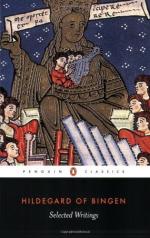|
This section contains 6,810 words (approx. 23 pages at 300 words per page) |

|
SOURCE: Samuel Lyndon Gladden, "Hildegard's Awakening: A Self-Portrait of Disruptive Excess," in Representations of the Middle Ages, edited by Bonnie Wheeler, Academia Press, 1993, pp. 217-33.
In the following essay, Gladden challenges the notion (promoted by Hildegard herself) that Hildegard was a passive agent of God's will whose writings merely record divine truth as it was imparted to her. Gladden argues that "Hildegard's role as an active, subjective editor of God's message becomes clear" and attempts to demonstrate that Hildegard 'knowingly and will-fully encodes a feminine voice in the midst of what appears to be the message of an obviously male-identified God."
The twelfth-century German mystic Hildegard of Bingen is perhaps best known for her extraordinary relationship with God, a relationship which apparently enabled Hildegard to communicate directly the voice and words of God to humans. Appearing to Hildegard in a series of visions, God made clear his desire...
|
This section contains 6,810 words (approx. 23 pages at 300 words per page) |

|


